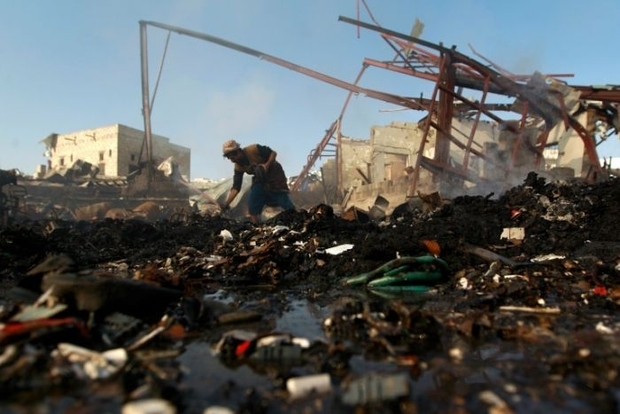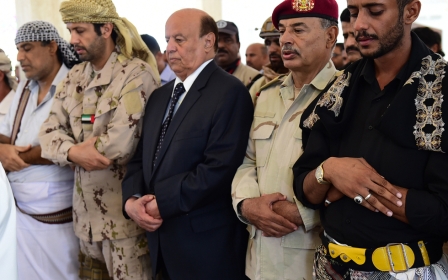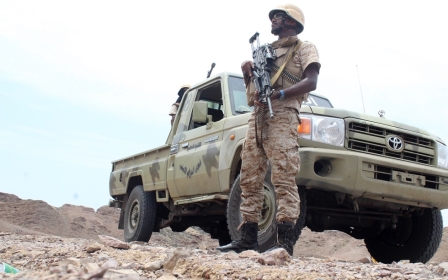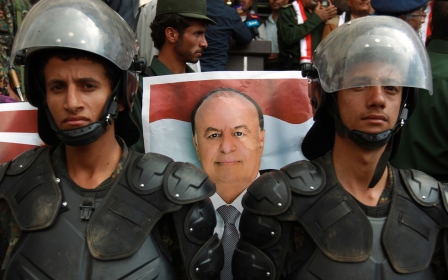Yemen's Hadi rejects UN peace plan amid deadly raids

Yemen's president on Saturday rejected a UN peace proposal for his war-battered country, as air strikes by his Saudi-led coalition allies killed at least 47 rebels, inmates, and civilians.
Forces loyal to President Abd Rabbuh Mansour Hadi's government have been locked since 2014 in deadly battles with Iran-backed Shia Houthi rebels who overran the capital Sanaa late that year.
The conflict escalated in March 2015 when Saudi Arabia launched a military campaign to push back the rebels.
The war has left almost 7,000 people dead, mostly civilians, according to the United Nations which had been struggling to convince the warring parties to implement a ceasefire and revive a stalled political process.
The latest peace proposal submitted by UN envoy Ismail Ould Cheikh Ahmed was rejected by Hadi, who even refused to receive it as he met the mediator in Riyadh.
While the government has shifted its temporary headquarters to second-city Aden, Hadi resides in Riyadh with most senior officials.
The contents of the roadmap that the envoy already presented to the rebels on Tuesday have not been made public.
Informed sources say it calls for agreement on naming a new vice president after the rebels withdraw from Sanaa and other cities and hand over heavy weapons to a third party.
Hadi would then transfer power to the vice president, who would appoint a new prime minister to form a government in which the north and south of Yemen would have equal representation.
'Door to more suffering'
A statement on the government's sabanew.net quoted Hadi as saying the roadmap "only opens a door towards more suffering and war and is not a map for peace".
It quoted Hadi as saying the plan "rewards the putschists while punishing the Yemeni people and legitimacy".
It was unclear how Hadi's Arab backers might react to his refusal, especially after a key coalition member, the United Arab Emirates, hailed the proposal on Thursday as a "political solution for the Yemeni crisis".
Saudi Arabia has not commented on the UN envoy's latest proposal and the rebels have yet to respond.
Warring parties in Yemen are under mounting international pressure to end the conflict that has left the already-impoverished country grappling with increasing cases of malnutrition and a spread of disease.
Yemen was already the poorest country in the Middle East even before the war started, the Telegraph reported. As the conflict has escalated, its small economy has crumbled. Social welfare transfers to the poorest stopped nearly two years ago.
Private-sector jobs have almost vanished as the ongoing conflict, blockade, and air strikes have targeted factories and businesses either directly or indirectly. Fuel shortages, water scarcity, import blockades, and the destruction of roads and ports have destroyed agriculture, the Telegraph said. The last lifeline for millions of Yemenis, public sector salaries, stopped in August.
The coalition, for its part, is under pressure over the high civilian death toll from its bombing campaign.
On Saturday, four air strikes hit three residential buildings killing 17 people and wounding seven others in the battleground town of Salo, southeast of third-city Taez, according to rebel-controlled media.
A local Yemeni official loyal to the government said the coalition air strikes had hit three adjacent homes by mistake.
"All those in the houses were killed," he told AFP, adding that a child and seven women were among the dead.
Hours later, fresh air strikes on a rebel-held security building in Yemen's west killed at least 30 prisoners and rebels, military officials said.
The two air strikes destroyed the building in Zaidia, north of the port city of Hodeidah.
The building houses a prison holding more than 40 inmates, most of them opponents of the Houthi rebels controlling the area, a military source close to the rebels told AFP.
A number of rebels inside the building at the time were also killed in the attack, the source added.
Residents confirmed the attacks and medics gave the same toll without being able to immediately give a number for the wounded.
It was not yet clear why the coalition targeted the building holding anti-rebel inmates.
There was no immediate comment from the coalition on the attacks.
Central bank bombing foiled
Further south in second city Aden, the temporary seat of government, guards on Saturday thwarted a suicide attack on the central bank, opening fire on the bomber's vehicle and blowing it up before it reached the building, a security official said.
The bank has been based in Aden since Hadi last month ordered its relocation from Sanaa, accusing the rebels of running down Yemen's foreign reserves.
Five guards were wounded when the bomber's vehicle blew up around 30 metres from the bank building, the security official told AFP.
The bank's relocation has been a major blow to the rebels, forcing them to halt salary payments to state employees in the large areas of the country they control.
A UN report released in August found that the rebels and their allies were diverting about $100m a month from the central bank, and that its foreign reserves had dwindled to $1.3bn from about $4bn in November 2014.
Middle East Eye propose une couverture et une analyse indépendantes et incomparables du Moyen-Orient, de l’Afrique du Nord et d’autres régions du monde. Pour en savoir plus sur la reprise de ce contenu et les frais qui s’appliquent, veuillez remplir ce formulaire [en anglais]. Pour en savoir plus sur MEE, cliquez ici [en anglais].




